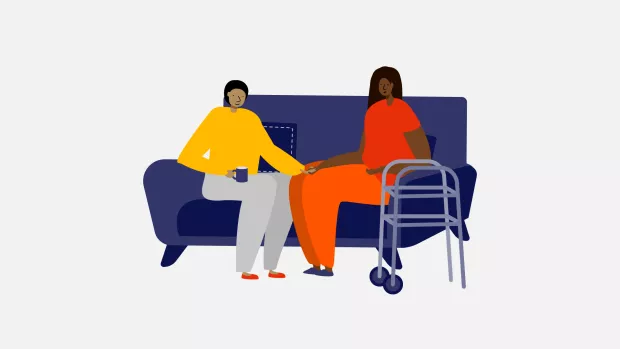
Pregnancy, birth, breastfeeding and MS
Lots of people with MS have children after they're diagnosed. As with any pregnancy, there’s lots to plan and think about, but if you've got MS there might be extra things to consider and questions you might have.
On this page we’ll try to answer some of those questions. We've looked at the latest evidence and guidelines for pregnancy, birth and breastfeeding if you've got MS. That includes information about disease modifying therapies (DMTs), vitamin D and steroids for MS relapses.
If you're pregnant, you could get involved in a study into care and support for people with MS before, during and after the birth. Find out more about UK MS Pregnancy Register
Read more about pregnancy, birth, breastfeeding and MS
Could DMTs for my MS harm my developing baby?
Some DMTs could harm babies developing in the womb. If you are planning to try for a baby, or you’re pregnant already, let your neurologist know straight away. They can discuss your best plan of action – explaining the benefits and risks for you and your developing baby.
You and your neurologist will consider how active your MS is, and what DMT you take. The balance between benefit and risk will be a personal one.
For example, with natalizumab (Tysabri), you might agree to keep taking it for some months into the pregnancy, or to come off it before you get pregnant. Guidelines now say you can take glatiramer acetate (Copaxone) and the beta interferons while you’re pregnant if you need to. Others like ocrelizumab (Ocrevus) and ofatumumab (Kesimpta) are safe to take up until you've become pregnant. After that usually you'll stop taking these two drugs until after you've had your baby. With these two drugs your neurologist might want you to avoid taking the drug a few months before you try to get pregnant.
But some DMTs are not considered safe during pregnancy. For example, if you take fingolimod (Gilenya) or teriflunomide (Aubagio) you should speak to your neurologist about stopping before trying for a baby.
When you start taking some DMTs, you might be advised to use contraception. You can read more about contraception and DMTs on our Contraception and MS page. It includes information about sperm and DMTs.
If you stop a DMT because you plan to get pregnant, you’ll usually need to do this a few months in advance. That’s so the medication in your body drops to a safe level. Depending on the drug, that could take between one and 12 months.
Always get advice from your neurologist before you stop taking a DMT.
The Association of British Neurologists (ABN) has detailed information written for neurologists. It includes two articles with recommendations about DMTs and pregnancy.
Read the 2019 ABN pregnancy guidelines
Read the 2022 ABN pregnancy guidelines for ocrelizumab (Ocrevus), ofatumumab and rituximab
If you're pregnant, you could get involved in research with the UK MS Pregnancy Register. The study aims to help understand the risks and benefits of continuing or stopping treatments during pregnancy.
Can I take DMTs while I breastfeed?
You can take some DMTs and breastfeed, but others should be avoided. This is because some drugs can get into your breast milk and could harm your baby, but others can’t.
For example, with beta interferons, glatiramer acetate (Copaxone), ocrelizumab (Ocrevus) and ofatumumab (Kesimpta) the Association of British Neurologists (ABN) advise that breastfeeding should be encouraged.
But some other drugs, including fingolimod (Gilenya) and cladribine (Mavenclad) shouldn’t be used when breastfeeding.
Your neurologist can give you advice about your DMT and safe breastfeeding.
The ABN has detailed guidance about pregnancy and MS for health professionals:
Read the detailed ABN guideline for health professionals on pregnancy and MS
Does having MS affect women’s fertility?
Having MS doesn’t seem to affect fertility. But some people have sexual difficulties because of their MS.
Will pregnancy affect my MS - long term or relapses?
If you get pregnant it won’t make your MS worse in the long run.
Relapse risk while you’re pregnant
Research shows that MS seems to be less active during pregnancy. This is especially true during the last 3 months (the "third trimester"). Hormone changes probably play a role in this positive effect.
For most people, the risk of having a relapse is lower when they’re pregnant. But this risk can go up if you stop taking certain DMTs. That’s because stopping the treatment outweighs the effect of being pregnant.
If you’re thinking of getting pregnant, or you discover you are, discuss your DMT options with your neurologist. That way you can decide what’s best for you and the baby.
Relapse risk after the birth
Until recently, research showed the risk of a relapse soon after the birth was higher than before pregnancy.
But newer research doesn't show this increased risk to the same degree. This could be because neurologists can now give more advice on the use of DMTs before, during and after pregnancy.
The research shows average risks, and your risk of a relapse will be different to someone else’s. So it’s worth discussing your risk and DMT in advance with your neurologist.
Relapse risk and fertility treatments
Recent research suggests IVF fertility treatment doesn’t increase the risk of relapses during the process. The evidence for this was strongest for people who keep taking a DMT until the embryo is implanted in the womb.
Your neurologist can discuss this with you before you start any fertility treatments.
Can I keep taking treatments for MS symptoms if I’m pregnant?
You might need to stop taking certain treatments for MS symptoms while you’re trying for a baby or if you’re pregnant.
But it depends on the treatment, and it’s something to discuss in detail with your neurologist or MS team. There might be a pregnancy-safe alternative they can offer. Or other ways to manage the symptom while you’re off the medication.
Don’t stop taking any treatment without discussing it with your MS team.
Read more about managing different MS symptoms:
Can I take steroids for a relapse if I’m pregnant?
Steroids are usually considered safe to take during pregnancy if you need them for a relapse.
If you need to take steroids, your neurologist will discuss the benefits and any possible risks.
Should I take vitamin D for my pregnancy?
Government guidelines recommend that everyone takes vitamin D supplements (10 micrograms/400 IU per day if you're older than one). This includes women who are pregnant or breastfeeding.
But these guidelines aren’t specific to people with MS. Sometimes neurologists suggest higher doses, and these are safe during pregnancy. Speak to your MS team about what you should take before, during and after pregnancy.
Can I have a healthy pregnancy and birth with MS?
Several studies have shown that mothers with MS are just as likely to have healthy pregnancies and healthy babies as those without.
Research so far shows that having MS does not increase the risk of miscarriage, premature birth, still-birth, birth abnormalities, or ectopic pregnancy (where a fetus develops in a fallopian tube).
Having MS doesn’t mean that you'll need to have an epidural any more than anyone else with similar mobility problems or disabilities. Epidurals and anaesthetics for caesarean (c-section) births are as safe for people with MS as those without.
Planning for after the birth
The days, weeks and months after the birth can be very tiring for anyone. It also takes time to get used to caring for a growing and demanding newborn. If you also get fatigue with MS, or other symptoms, this can be extra hard to manage.
So arranging support in advance could make a huge difference to your ability to cope. This support could come from family and friends, your community, health services or local support groups.
It might be worth asking your MS team if there are extra support services available for new parents with MS in your area.
Knowing you have this support organised in advance can be mentally reassuring as well as practical. Not only for you, but for your partner and other close family members.
Re-starting your DMT
Before lots of people took DMTs, studies showed the risk of relapses was higher for 3 months after the birth.
Newer research suggests the risk goes up less than it used to.
The studies look at average relapse risk. So it’s a good idea to discuss in advance with your neurologist about what your relapse risk might be, and about re-starting DMTs.
Get help if you feel low
Pregnancy and MS both carry a risk of depression. If you have concerns or worries about this, or think you might be having depressive thoughts before, during or after pregnancy talk to your doctor, midwife or MS team. They'll understand and will be able to help.
You don’t have to deal with depression alone – whether that’s post-partum depression (also known as the baby blues), depression because of MS, or any other reason.
Visit our MS Helpline for free support for people living with or affected by MS
Will my children get MS?
MS isn’t directly inherited from parents. And it can’t be passed on through breastfeeding.
We don’t yet know exactly why people get MS, but it's likely to be a combination of genetics and things in the environment.
Because genes are involved, the risk of someone having MS does increase if they have a parent with MS. But there’s still a much bigger chance they won’t get MS.
For every 1,000 people who have a parent with MS, about 15 will get MS (985 won’t).
Read about Nicola's experience of pregnancy and MS in our community blog
Can I breastfeed if I have MS?
You can breastfeed with MS if you want to and you’re able to – just like anyone else.
MS symptoms like fatigue, or some MS treatments might affect your choice. But you should make the choice that works for you and your baby.
Breastfeeding won’t make your MS worse, and MS can’t be passed on through breast milk.
Some research has suggested that people who feed their baby with only breast milk might have a lower chance of relapse after giving birth. But this is only one thing to consider about breastfeeding, and some women will still have a relapse even if they choose to breastfeed.
If you breastfeed, you might want to try and store some breast milk in the freezer. This can be a back up if MS symptoms get in the way of feeding.
Some people choose to combine breast feeding and bottle feeding.
If you’ve any concerns about breastfeeding, speak to your MS nurse, midwife and health visitor. Your neurologist can help you decide about taking a DMT while breastfeeding.
You can safely take some DMTs if you breastfeed, but not all. We've got more on DMTs and breastfeeding in the question above.
Can I take steroids if I’m breastfeeding with MS?
You can take steroids to help manage an MS relapse if you’re breastfeeding.
Only very small amounts of steroid pass through the breast milk to the baby.
If you want to keep this amount at its lowest, you could wait 2-4 hours after each steroid treatment before you breastfeed.
Last full review:
We also update when we know about important changes.




